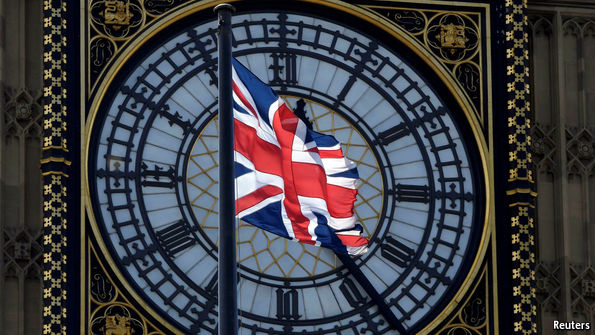By BAGEHOT
Wow, her eyes! I just took over as Bagehot the other day, on April Fools’ Day, after not keeping up with British politics since 1993. I was just getting settled into my new job—getting my parliamentary pass, lunching with MPs who happened to have been at Oxford with me, planning a trip out to the mysterious North. And now I have an election to cover!
Theresa May’s decision to call a general election has been thoroughly chewed over by now. This was obviously a good call. Labour is as weak as it has ever been; Mrs May will be able to stamp her own authority on her party; shifting the next general election from 2020 to 2022 means that she won’t be negotiating with the EU against the sound of a ticking clock. I also sense that this could be a highly significant election. Mrs May is hardly an electrifying politician—she’s a competent grind with an unpleasant willingness to play to the Daily Mail. But she’s operating in electrifying times—and she has an interesting sense that something has gone wrong with globalisation and that we need to reach back into our national traditions, our sense of ourselves as a community, to fix it.
This is the first election to be called in the post-globalisation era. British politics since the 1980s has been dominated by liberal globalisation: dismantling the corporate state at home; pushing for a single market in Europe; championing global integration around the world. Britain was the poster-boy of this creed. It created the most liberal market in corporate control in the world; sucked in more immigrants in 20 years than it has in a thousand; and, in London, created the world’s most global city.
The champions of liberal globalisation (ie anybody with any power) argued that their project was in everybody’s interests, poor as well as rich. Globalisation might produce disruption and kill off old industries. But the economy as a whole would be healthier. And the political elites knew how to manage all this disruption. They understood enough about the workings of the economy to limit the turbulence caused by free flows of money and goods across borders—indeed they were so good at economic management that they had abolished the boom-bust cycle. They could compensate the losers with training and welfare benefits. Gordon Brown, Tony Blair’s chancellor, became adept at skimming off some of the City’s profits and recycling it in the form of new schools and doctor’s surgeries for the Labour Party’s heartland constituencies in Wales and the North.
Globalisation was a wonderful thing for the global economy in general. Hundreds of millions of people have been lifted out of poverty. I recently visited Qingdao in China, a second-division city that I’d barely heard of, which was full of sky-scrapers, brand-new cars and self-confident and optimistic people. The benefits haven’t been so obvious in Britain. We got the challenge and disruption but many people got stagnation rather than rapidly rising living standards.

